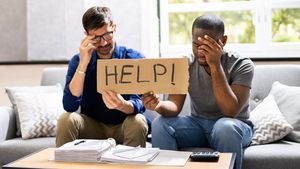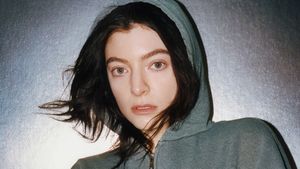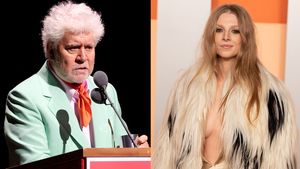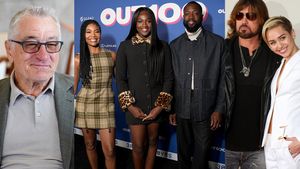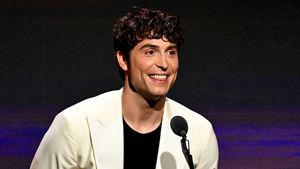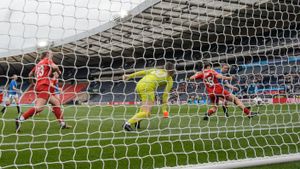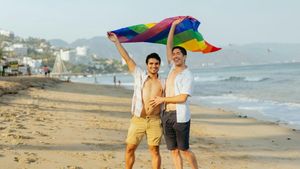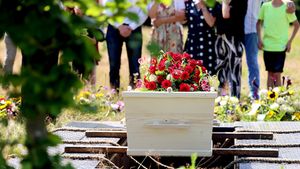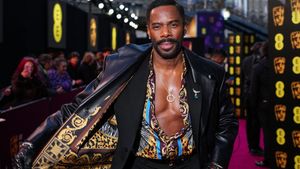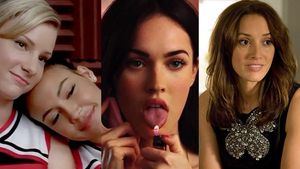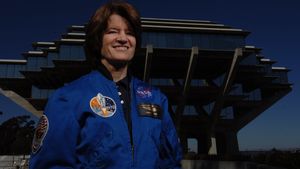In season nine of RuPaul’s Drag Race, Eureka O’Hara famously declared “stakes are high, hearts are pounding, buttholes are clenched.” Beyond being utterly memeable, that’s an accurate description of We’re Here’s heart-pounding and heartwarming season three premiere episodes which saw its iconic queens Eureka, Shangela, and Bob the Drag Queen, visiting Granbury, Texas — a place that didn’t want them there and wasn’t afraid to let them know, sometimes with threats of violence.
The stakes were indeed high, hearts were pounding, and well, you know the rest.
But if you thought you saw it all in the episode, that was just the beginning, as Bob the Drag Queen tells PRIDE. “There are a lot of times our teams felt very unsafe being in this town because baby this may shock you but we’re actually not the most flamboyant people on the We’re Here team. Queens and fairies and dandelions are behind the scenes of We’re Here. And a lot of them felt really uncomfortable,” he recalls. “There were signs around town that were like if you’re a part of this show, don’t come in here. Signs right on the front of businesses like if you’re a part of this We’re Here business don’t come in here... it was scary.], sometimes it was genuinely terrifying.”
However, the three of them (and their teams) didn’t let the intimidation stop them, because the reality is thay not only is the show highly entertaining and moving. But its stars are doing good work. Simply their presence in the face of bigotry, defiant and bedecked in rhinestones has the power to change hearts and minds, and its why even with the level of success they have achieved in their career, they are still willing to be out there on the front line.
“It’s so important for us to be a part of the show, and connecting with our drag kids and filing stories. Because it matters,” Shangela tells PRIDE. “We hear this whether it’s in messages, online comments, in conversations with people how We’re Here is helping to connect them to experiences that they’ve had themselves. You don’t have to be from a small town to enjoy this show to get something from the show to let it make you feel something and... it’s creating change and I hope progress for LGBTQ+ people.”
It’s the kind of programming that Eureka would have appreciated growing up in Tennessee and not really ever seeing themselves represented. “I would have loved to have seen more of myself representing my community, not just earlier in life because I think it would have helped me as a bigger person, but also as a queer individual. And someone who was dealing with an environment in East Tennessee, where not only was my peer community very negative and anti who I was presenting, or who I was in general, or trying to tell me who I was,” they tell PRIDE.
Bob agrees that the impact of simply seeing a drag queen can be life-changing. “When I was in college, I went and I saw a drag show, and it changed my life. Even if it wasn’t in my town. I remember being an adult, I was an adult watching it on television and I heard that RuPaul had a TV show. I was like ‘Rupaul is making a TV show, this is remarkable.’ And I watched it in my life was literally changed,” she recalls. “So imagine, if I actually seen them walking down Buena Vista Blvd. in Columbus, Georgia. You can’t even imagine.”
Now in its third season, the show has touched many lives — although a humble Eureka struggles with being credited for doing so — and a lot has changed for the queens and in the world since the show first premiered in 2020. “Season one was we were just walking into the wind with our eyes closed in the thunderstorm,” recalls Bob. “ Season two, we were doing a show in the middle of a pandemic. And in season three, we have been on the tail end of a lot of political shifts, not just because of the election cycle, but also because of the pandemic. But I was still really excited to get back on the ground.”
Shangela agrees that this season felt different because the world is so different than when they started out. “There was a temperature change because our show is a real-life docseries. And so the show reflects what’s happening in our country right now,” he says. “There has been a shift in how people feel really, I think, emboldened, supported in being negative. And having these just really nasty hate speeches and dialogue and rhetoric, and our show felt that.”
While being a successful drag queen means they are a position where they could avoid some of this pain, it was important to Shangela to be there and bare witness. “The important thing is to know that that’s what everyone so many people in the LGBTQ+ community is feeling. So we gave a reflection of that, but also showed how a lot of people are able to push through it, to overcome it and still somehow build a sense of community in some of the most unlikely places.”
As dark as the world may seem at times, the queens have a secret — well not so secret — weapon: Glamour. Never underestimate the power of glam to effect change. “Glamour makes people happy. People get really excited when they see glitz and glamour and sparkle and joy and lashes and heels and sequins and rhinestones. Oh my! It really brings people a lot of joy,” says Bob. “ It makes me happy, that’s why I’m still doing it 14 years later That’s why I’m still torturing my body with corsets and pumps.”
Once you create that crack in people's walls, there is an opportunity for change, and growth Eureka says is what season three of the show is ultimately all about. “Growth is so important for our country, our queer community, also our allies right now more than ever, growth for ally ship more than anything, I think that you know, we highlight our allies a lot and this season, and how they affect our growth politically, how they affect our voices being amplified,” they say.
But of course, the truest message of season three is right there in the title. “No matter where you are in the world, no matter what country, no matter what community. We’re here. No matter where you stay it’s true. We’re here,” says Bob. “Queer people are everywhere. We pop up all over the place. Just know that you’re not here by yourself.”
We're Here Season 3 | Official Trailer | HBO
Is there going to be a season 3 of We’re Here?
Yes! It’s currently airing on HBO.
How many episodes were here season 2?
Season 2 featured 8 episodes.
Who created We're Here?
We're Here was created by Stephen Warren and Johnnie Ingram, and is executive produced by Warren, Ingram, Peter LoGreco, Eli Holzman and Aaron Saidman.
From Your Site Articles
Related Articles Around the Web














































